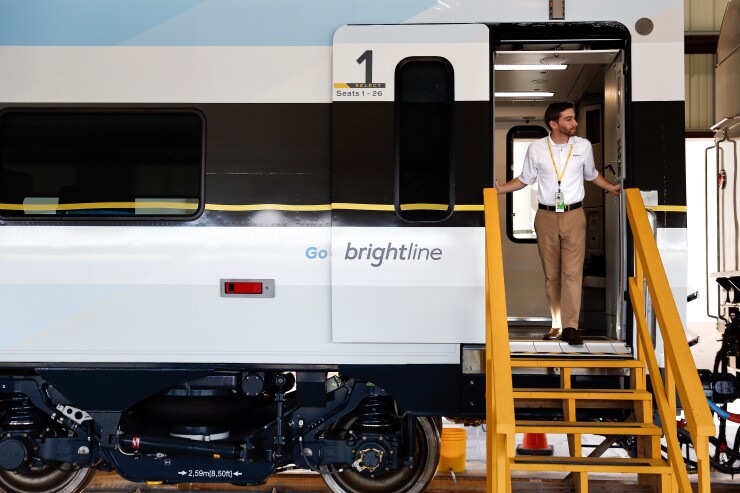Virgin Trains USA Inc., has put off what would have been the year’s biggest initial public offering so far.
The private passenger train operator, known as Brightline until it struck a licensing deal last year with billionaire Richard Branson, sought to raise as much as $538 million in an IPO that was set to price Tuesday.

“As we explored a public offering, a number of alternative financing sources became available that allow us to keep the company private and meet our growth strategies,” Ben Porritt, a spokesman for the Miami-based company, said in an emailed statement.
Virgin Trains may return to the equity market at a later time, said a person familiar with the matter who asked not to be identified because the decision hadn’t been made public at the time.
The offering, which would have valued the company at as much as $3.15 billion, had been expected to price below the marketed price range of $17 to $19 a share, a person familiar with the matter said Monday.
The company is planning to extend its South Florida passenger service to Orlando, home of Disney World. It’s also planning to begin service connecting Southern California to Las Vegas. Those expansions could help increase annual ridership 37-fold to 20.8 million passengers within five years, the company said in its IPO filing.
Tuesday’s IPO decision follows previous delays for Virgin Trains. Last year, the company, owned by Fortress Investment Group private equity funds, had to push back startup dates along the Florida corridor and thus missed its passenger forecast by about half, losing $87.1 million on $5.2 million in revenue in the first nine months.
The IPO was seen as a test for a new listings market that’s already been hamstrung by jittery investors worried about an ongoing trade war with China and the specter of the U.S. government shutting down again if President Donald Trump and Congress fail to sign off on a new spending agreement by Friday’s deadline.
Indeed, the five U.S. IPOs that priced in January raised a combined $353 million, the worst month since January 2016.
Virgin Trains has faced skepticism, too.
Josef Schuster, founder of Chicago-based Ipox Schuster LLC, said before the delay that he thought the targeted valuation for Virgin Trains, based on selling 17% of the company’s shares, was too high for such a speculative investment.
“It’s a great concept, but I think it’s going to be difficult for shareholders at the outset to make money on this deal,” said Schuster, whose firm oversees about $1.7 billion invested in recent IPOs.
Virgin Trains will eventually make three times more revenue from the Orlando run as from short hops between Miami, Fort Lauderdale and West Palm Beach, according to forecasts in a study by the firm Louis Berger, which was commissioned by the railroad.
Overall, Virgin Trains projects its Florida travelers will pay average fares of $73 apiece by 2023 or early 2024, all the while consuming food and merchandise along with paid advertising.
Virgin Trains has secured all major permits, real estate and track rights for the Orlando expansion and construction is underway, with completion expected in three years. Yet it needed another $1.9 billion on top of the expected IPO proceeds and was discussing as much as $2.3 billion in debt financing for 2019, according to regulatory filings.
Extending service from Orlando to Tampa, Florida, and connecting Las Vegas to Victorville, California, will cost $5.3 billion more. Virgin Trains announced in September that it had agreed to buy DesertXpress Enterprises LLC for $120 million, giving it rights to develop the Las Vegas-Southern California corridor. It also acquired 38 acres for a station and mixed-use development next to the Las Vegas Strip for $150 million.
In the long run, the company could take its 125-mile-an-hour top speed trains to other U.S. markets that meet its basic criteria: essentially, key population centers separated by about 200 miles to 300 miles.
Passengers on Monday at the impeccable Miami station — still outfitted with the old Brightline logo — included commuters, students and out-of-town travelers.
Zachary Potter, a 43-year-old family lawyer based in Palm Beach, said the train had already allowed him to take more cases in Miami. He’s able to get work done all the way down and back while avoiding highway delays.
“It’s clean. It’s on time. It’s not crowded -- and you avoid all the Miami traffic,” he said on his way to the train. “It’s wonderful.”





